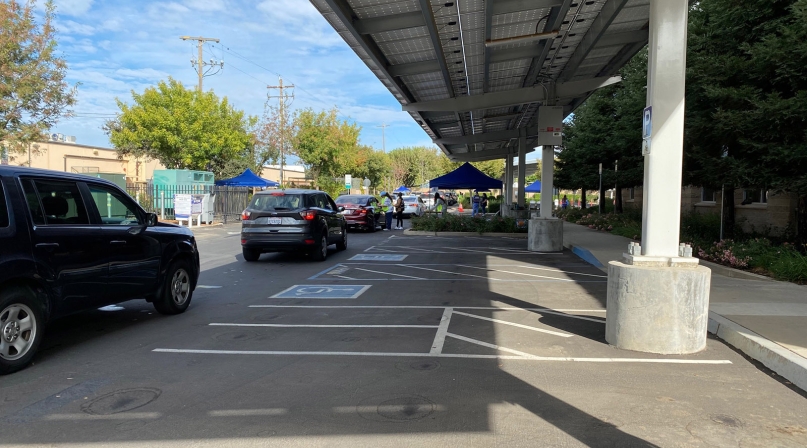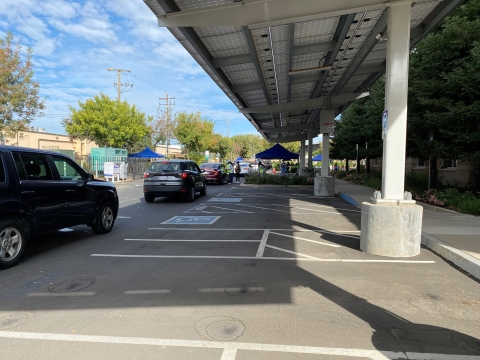Flu shots serve as a ‘rehearsal’ for COVID vaccine delivery
Author
Upcoming Events
Related News

It’s that time of year again — the start of flu season — and this year, public health officials already have a lot on their plates.
As COVID-19 cases climb in recent weeks at the same time flu activity peaks, counties are fighting to ward off a “twin-demic” situation battling two viruses at once.
While counties encourage residents to receive a flu shot every year, getting a vaccine now may be more important to avoid overwhelming healthcare systems. Counties are using this opportunity to test mass distribution plans for a possible COVID-19 vaccine on the horizon.
Yolo County, Calif. recently held its first mass drive-thru clinic to administer flu vaccinations for county residents.
Emergency Services Manager Dana Carey said there’s a prioritization to get as many individuals vaccinated for seasonal influenza every year, but with medical resources already focused on COVID-19 response, the county is encouraging preventative measures to ensure they’re not stretching resources too thin.
“We’re really trying to conserve our medical capacity by doing every single mitigation effort that we can, and the seasonal influenza vaccination would be considered a mitigation effort against seasonal flu,” she said.
While the county has practiced plans to distribute a vaccine or pill in the case of a bioterrorism event such as anthrax, most of the plans take place in walkthrough types of settings such as gymnasiums or other open spaces.
The county held its first mass point of dispensing influenza vaccines via drive-thru and will hold more to test its plans for future drive-thru processes.
Carey described the added complications of a drive-thru clinic including additional equipment and added labor of setting up, running and tearing down the drive-thru all in one day. Other complications include on-site operations such as blocking the traffic to avoid impeding city roadways.
“It’s a really labor-intensive thing, but it allows us to move those resources pretty much anywhere we need them to be so we’re testing some of the larger sites,” Carey said.
The mass drive-thru clinics allow the county to test a variety of scenarios for future mass vaccine distributions.
This year, the county tested a digital system that calls volunteer staff the night before a clinic to remind them about their commitment and what time they need to arrive.
The county tests other procedures such as patient forms and advertising methodologies used to ask participants how they heard about a clinic to best reach the public.
The county will also be testing how to transport vaccines, Carey said, adding that the COVID-19 vaccine may need to be transported at a certain temperature which requires specific logistics to ensure it stays within the proper temperature range.
For this year’s drive-thru flu clinics, she said they are testing the best ways to gather more contact information from participants. With the COVID-19 vaccine possibly coming in a two-shot series, the county may need to contact patients to come back for the second vaccine.
“It’s definitely training hundreds and hundreds of personnel on how we may have to do it,” she said.
During the first mass drive-thru held in October, the county administered nearly 300 flu vaccinations in about two-and-a-half hours. The drive-thru closed early because they ran out of vaccines. While Carey doesn’t attribute this to the coronavirus, she said the county has been heavily advertising the flu vaccine drive-thrus to have more people to test the system.
“We want to make sure our designs work and that our staffing plans work and it’s really hard to test something that large without having the patient throughput needed,” she said.
Carey said her message to county residents is no different than every year and stressed the importance of receiving a flu shot.
“It protects you, it protects your family, it protects the people around you and,” she noted, “especially this year it’ll help alleviate some of the stress on our medical system so that we can keep dealing with COVID side by side with the flu season.”

Attachments
Related News

White House Executive Order establishes national substance use disorder response
On January 29, the White House issued an Executive Order (EO) establishing the Great American Recovery Initiative, a new federal effort aimed at coordinating a national response to substance use disorder (SUD).

USDA and HHS release new dietary guidelines
On January 7, U.S. Department of Agriculture Secretary Brooke Rollins and U.S. Department of Health and Human Services Secretary Robert F. Kennedy, Jr. unveiled the new Dietary Guidelines for Americans, 2025–2030.

SAMHSA cancels, reinstates thousands of behavioral health grants
Late on Wednesday, January 14, the Administration announced that thousands of Substance Abuse and Mental Health Services Administration (SAMHSA) grants that had been terminated just one day earlier would be reinstated.
